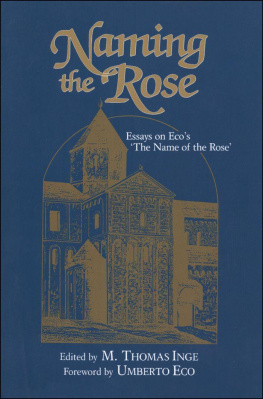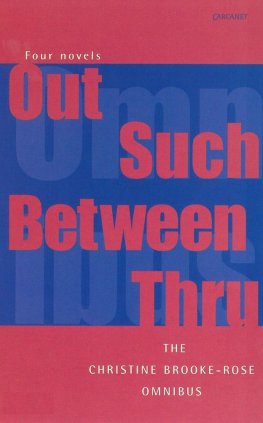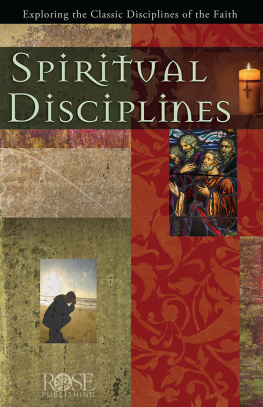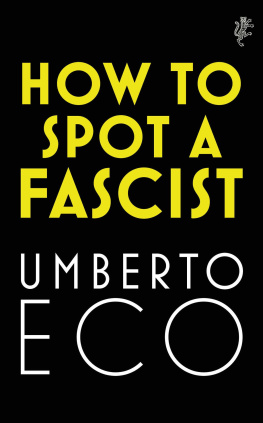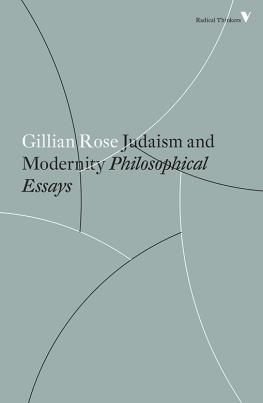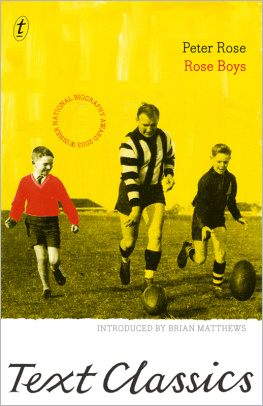NAMING THE ROSE
NAMING THE ROSE
Essays on Ecos
The Name of the Rose
EDITED BY
M. Thomas Inge

Copyright 1988 by the University Press of Mississippi
All rights reserved
Manufactured in the United States of America
The paper in this book meets the guidelines for permanence and durability of the Committee on Production Guidelines for Book Longevity of the Council on Library Resources.
Library of Congress Cataloging-in-Publication Data
Naming the rose : essays on Ecos The name of the rose / edited by M.
Thomas Inge,
p. cm.
Includes index.
ISBN 978-1-61703-034-5
1. Eco, Umberto. Nome della rosa. I. Inge, M. Thomas.
PQ4865.C6N636 1988
853.914dcl9
87-27681
CIP
Excerpts from The Name of the Rose by Umberto Eco, copyright 1980 by Gruppo Editoriale Fabbri-Bompiani, Sonzogno, Etas S. p. A.; English translation copyright 1983 by Harcourt Brace Jovanovich, Inc. and Martin Seeker & Warburg Limited. Reprinted by permission of Harcourt Brace Jovanovich, Inc.
Contents
UMBERTO ECO
HANS KELLNER
LOIS PARKINSON ZAMORA
MARK PARKER
MICHAEL COHEN
JOAN DEL FATTORE
PIERRE L. HORN
H. ARAM VEESER
HELEN T. BENNETT
JOCELYN MANN
DEBORAH PARKER
ROGER ROLLIN
JACKSON R. BRYER AND RUTH M. ALVAREZ
Introduction
Umberto Ecos The Name of the Rose is a major and most unusual literary phenomenon of the 1980s. Written by a professor of semiotics from the University of Bologna who had already attracted international attention for his scholarship and critical commentaries, the novel was an immediate bestseller when published in Italian in 1980 and was subsequently translated into twenty languages. When the English translation appeared in the United States in 1983, The Name of the Rose remained on the hardcover best-seller list for forty weeks, with half a million copies sold. Paperback publication rights brought $550,000, reportedly the highest price ever paid for a translation in paperback; and the initial print run was over 1.2 million copies. The book stayed at the top of the paperback bestseller list for weeks, was widely read on college campuses, and in 1986 became a motion picture.
What is to account for such success for a detective novel set in a medieval monastery, a work which not only has a compelling narrative but in the process of working out the intricacies of its plot deals with such unlikely topics as early church history, theology, philosophy, language, humanism, art, the Enlightenment, literary criticism, theories of comedy, and the structure of libraries? How did Eco succeed in producing that rarity to highbrow criticsa widely popular work of fiction that addresses themes of considerable intellectual consequence? Answering these questions will require a good deal of thought and time, if indeed they are answerable.
In the meantime, we can at least begin to explore the complexity and cultural significance of Ecos remarkable novel in terms of its background and literary context. Focusing less upon the public response (although one essay surveys a selected group of readers), the essays gathered in this book examine the novel in light of some of the various traditions from which it draws, theories of detective fiction, comedy, postmodernism, the Apocalypse, semiotics, and literary criticism, all areas of inquiry in which Eco is something of an authority himself.
The essays in the first section place Ecos novel in the broader traditions of Western thought and literature. Hans Kellner notes the various works and writers that have influenced EcoLewis Carroll, Jorge Luis Borges, and Sir Arthur Conan Doyle among themand identifies some of the medieval sources of names and ideas. He examines political and theological influences but focuses finally on the function of laughter in the novel. After surveying the sources of thought on the subject among medieval thinkers and modern critics, Kellner decides that the readers are, finally, the butts of the humor for their willingness to participate in the games and misleading trails of the playful narrative.
Lois Parkinson Zamora addresses the extent to which Eco uses the themes and ideas of the apocalypse as reflected in the Book of Revelation and other texts and suggests that it is the shared sense of dangerous times and threatening transition that joins our world with Ecos fictional one. Images of chaos preceding the end of the present world have a continuing strong appeal for readers, as demonstrated not only by the success of Ecos novel but the popularity of such writers as Walker Percy, Gabriel Garca Mrquez, Carlos Fuentes, and Mario Vargas Llosa. Mark Parker takes another tack in examining The Name of the Rose as a conscious example of postmodern fiction, that is, an ironic retort to the tradition of modernism, which itself had been an effort to achieve an abrupt break with all previous tradition. This means that postmodern writers lack a strong system of values or standards against which to rebel. Postmodern critics, however, have looked to mass culture as a gesture of affirmation. Parker analyzes Ecos critical statements on these matters as a way of coming to terms with The Name of the Rose, a fulfillment of Ecos stated belief that it is possible to write a novel that is both aesthetically valid and popular entertainment.
The most obvious genre of popular literature to which The Name of the Rose belongs is, of course, the detective novel, and the second group of essays examine the several ways Eco has used and played with the venerable form. Michael Cohen believes that Eco not only borrows creatively from and pays homage to the great practitionersfrom Voltaire and Doyle to Borges and the hard-boiled school of writersbut that he uses the failure of his detective, William of Baskerville, as a way of questioning the rationalistic premises on which the form depends. Joan DelFattore, however, notes that Eco has conflated classic detective methodology with the theological methodologies of Roger Bacon and William of Ockham, supporters of experience and logic and the two theologic masters of William of Baskerville. She concludes that it is not the method of detection that fails William but, rather, he who fails the method.
Pierre L. Horn finds that, whereas Eco has drawn on all the theories of classic detection, he has carried them into the realm of humanism through the difficult moral choices and rationalistic dilemmas posed by the plot and circumstances. The reasons for the deaths and disasters in the novel ultimately are related to William and Adsos humanistic pursuit of knowledge. H. Aram Veeser argues that Eco refuses to accept the rigid, rational conventions of detective fiction and its movement from chaos and obscurity to order and clarity, offering instead the open, medieval countertradition of carnival and laughing satire derived from Lucian, Rebalais, and others.
It is only natural that most of the essays in this book contain references to semiotics (the study of language as a system of signs), since Eco is one of the contemporary masters of the field. Although he declaims any intention to produce a novel consistent with his semiotic theories, Eco acknowledges that there are bound to be relationships. The essays in the third section consider some of these connections. Helen T. Bennett goes back to the fourteenth-century work of William of Ockham to discover parallels between his medieval nominalism and the twentieth-century semiotic theories of Charles Sanders Peirce. These parallels make the medieval setting a suitable one for the actions of William of Baskerville, a reader of signs caught in what is actually a modern semiotic dilemma rather than a simple murder mystery.
Next page
